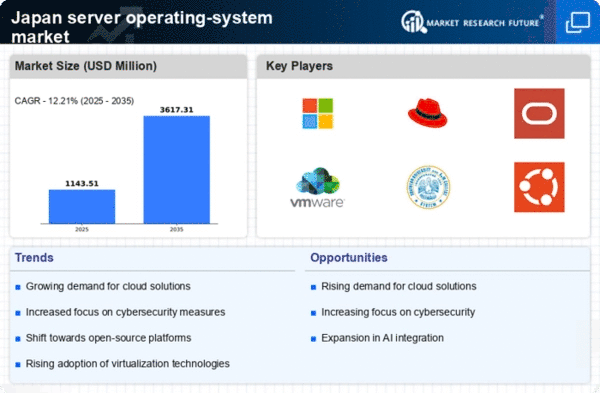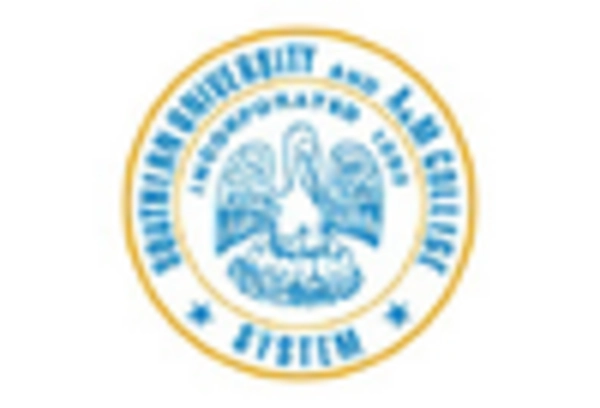Shift Towards Open Source Solutions
The server operating-system market in Japan is witnessing a significant shift towards open source solutions. Organizations are increasingly recognizing the benefits of open source operating systems, such as flexibility, cost-effectiveness, and community support. This trend is particularly pronounced among small to medium-sized enterprises (SMEs) that seek to minimize licensing costs while maintaining robust server performance. Data suggests that the adoption of open source server operating systems has grown by approximately 25% in the past few years, reflecting a broader acceptance of these technologies. Additionally, the collaborative nature of open source development fosters innovation and rapid updates, which are essential in a fast-evolving technological landscape. The server operating-system market is thus adapting to this shift, as businesses prioritize solutions that offer both reliability and adaptability in their IT environments.
Integration of Artificial Intelligence
The integration of artificial intelligence (AI) into server operating systems is transforming the landscape of the server operating-system market in Japan. AI capabilities enable enhanced automation, predictive maintenance, and improved resource allocation, which are critical for modern data centers. As organizations increasingly adopt AI-driven solutions, the demand for server operating systems that support these technologies is likely to rise. Recent statistics indicate that the AI market in Japan is projected to reach approximately $20 billion by 2025, suggesting a robust growth trajectory. This integration allows for more intelligent decision-making processes, optimizing server performance and reducing downtime. The server operating-system market is thus witnessing a shift towards systems that not only support traditional workloads but also leverage AI to enhance operational capabilities and drive innovation.
Rising Demand for Data Center Efficiency
The server operating-system market in Japan experiences a notable surge in demand for data center efficiency. As organizations strive to optimize their IT infrastructure, the need for advanced server operating systems that enhance performance and reduce energy consumption becomes paramount. According to recent data, energy costs account for approximately 30% of total data center expenses. Consequently, businesses are increasingly investing in server operating systems that facilitate virtualization and resource management, leading to improved operational efficiency. This trend is further fueled by the Japanese government's initiatives to promote energy-efficient technologies, which align with the broader goals of sustainability and reduced carbon footprints. The server operating-system market is thus positioned to benefit from this growing emphasis on efficiency, as companies seek solutions that not only meet their operational needs but also contribute to environmental sustainability.
Increased Focus on Hybrid Cloud Solutions
The server operating-system market in Japan is increasingly influenced by the growing focus on hybrid cloud solutions. As organizations seek to balance on-premises infrastructure with cloud capabilities, the demand for server operating systems that seamlessly integrate with hybrid environments is rising. Recent surveys indicate that approximately 60% of Japanese enterprises are exploring hybrid cloud strategies, driven by the need for scalability and flexibility. This trend necessitates server operating systems that can efficiently manage workloads across diverse environments, ensuring optimal performance and security. The server operating-system market is thus evolving to meet these demands, with vendors developing solutions that facilitate smooth transitions between on-premises and cloud-based resources, ultimately enhancing operational agility.
Regulatory Compliance and Data Sovereignty
The server operating-system market in Japan is significantly impacted by regulatory compliance and data sovereignty concerns. As data protection laws become more stringent, organizations are compelled to adopt server operating systems that ensure compliance with local regulations. The Japanese government has implemented various data protection frameworks, which necessitate that businesses maintain control over their data within national borders. This has led to an increased demand for server operating systems that offer robust security features and compliance tools. Recent estimates suggest that compliance-related investments in IT infrastructure could reach $5 billion by 2026. The server operating-system market is thus adapting to these regulatory pressures, as companies prioritize solutions that not only meet operational needs but also align with legal requirements.
















